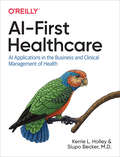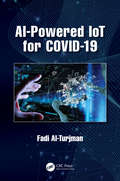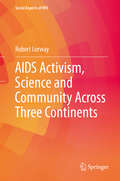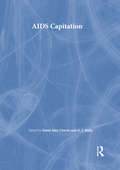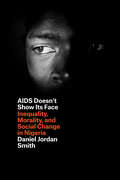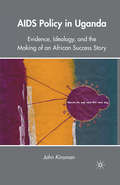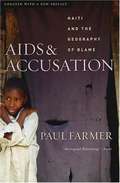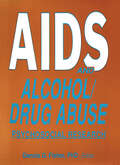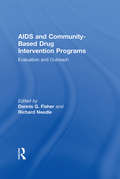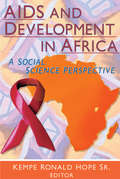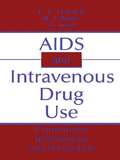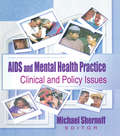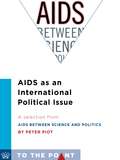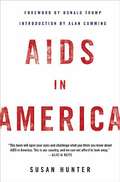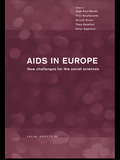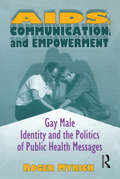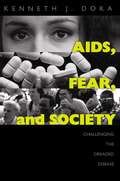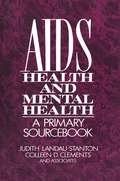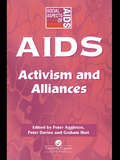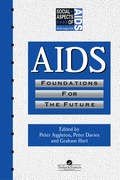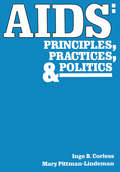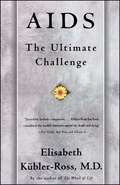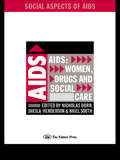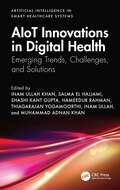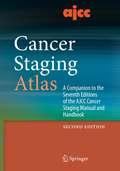- Table View
- List View
AI-First Healthcare
by Kerrie L. Holley Siupo BeckerAI is poised to transform every aspect of healthcare, including the way we manage personal health, from customer experience and clinical care to healthcare cost reductions. This practical book is one of the first to describe present and future use cases where AI can help solve pernicious healthcare problems.Kerrie Holley and Siupo Becker provide guidance to help informatics and healthcare leadership create AI strategy and implementation plans for healthcare. With this book, business stakeholders and practitioners will be able to build knowledge, a roadmap, and the confidence to support AIin their organizations—without getting into the weeds of algorithms or open source frameworks.Cowritten by an AI technologist and a medical doctor who leverages AI to solve healthcare’s most difficult challenges, this book covers:The myths and realities of AI, now and in the futureHuman-centered AI: what it is and how to make it possibleUsing various AI technologies to go beyond precision medicineHow to deliver patient care using the IoT and ambient computing with AIHow AI can help reduce waste in healthcareAI strategy and how to identify high-priority AI application
AI-Powered IoT for COVID-19
by Fadi Al-TurjmanThe Internet of Things (IoT) has made revolutionary advances in the utility grid as we know it. Among these advances, intelligent medical services are gaining much interest. The use of Artificial Intelligence (AI) is increasing day after day in fighting one of the most significant viruses, COVID-19. The purpose of this book is to present the detailed recent exploration of AI and IoT in the COVID-19 pandemic and similar applications. The integrated AI and IoT paradigm is widely used in most medical applications, as well as in sectors that deal with transacting data every day. This book can be used by computer science undergraduate and postgraduate students; researchers and practitioners; and city administrators, policy makers, and government regulators. It presents a smart and up-to-date model for COVID-19 and similar applications. Novel architectural and medical use cases in the smart city project are the core aspects of this book. The wide variety of topics it presents offers readers multiple perspectives on a variety of disciplines. Prof. Dr. Fadi Al-Turjman received his PhD in computer science from Queen’s University, Kingston, Ontario, Canada, in 2011. He is a full professor and research center director at Near East University, Nicosia, Cyprus.
AIDS Activism, Science and Community Across Three Continents (Social Aspects of HIV #1)
by Robert LorwayThis book critically examines the many complex entanglements between AIDS activism and HIV science. It takes readers on a medical anthropological expedition across time and space that highlights the stakes from the perspective of those most affected by the epidemic. Author Robert Lorway reveals how early in the HIV epidemic, amid inadequate government leadership, communities of people living with and directly affected by HIV and AIDS rose to become a vital force at the forefront of prevention responses. Yet now, more than three decades later, HIV prevention and treatment is increasingly being placed under the jurisdiction of clinical, epidemiological, and management scientific expertise. In this kind of context, where does activism figure into the possibility of more democratized collaborations between affected communities, scientists, and policy makers? Coverage draws upon the findings from an array of community research projects conducted in Canada, India, and Kenya over a 22-year period. It weaves together rich, original data sources that range from in-depth qualitative interviews, field notes, and primary and secondary archival document retrievals in these three regions. Offering a rich diversity in perspectives, this book tackles the broader themes related to global health policy, science, and transnational activism at the same time as it highlights the experiences and local arenas where debates about activism and science play out. In the end, Lorway questions the growing expectation for affected communities themselves to produce sound evidence to legitimize their advocacy projects. He calls for the planners and implementers of biomedically oriented HIV research and interventions to more meaningfully engage with communities in ways that de-monopolize decision making as a matter of ethics and improved scientific practice.
AIDS Capitation
by David A CherinDiscover effective strategies for AIDS healthcare!You’ll definitely want to see what’s documented inside AIDS Capitation if you’re affiliated in any way with current efforts to bolster and improve healthcare policies and procedures for AIDS victims and their families. With this scholarly, up-to-date guidebook, you’ll find that your awareness and knowledge base concerning contemporary AIDS healthcare issues will expand and diversify, giving you a more stable information base from which you can make your own policy changes and civic organization improvements.If you’re a practitioner in HIV/AIDS care, an academic in HIV/AIDS research, or one of the many public officials currently involved in healthcare reform, you’ll find the guidance and proven strategies you need in AIDS Capitation. AIDS Capitation gives you a broad range of information including: descriptive and evaluative aspects of the model of care directions for implementing an innovative model of terminal home care modalities of care in end-stage treatment measurement issues in evaluative research help in measuring outcomes in community-based care funding opportunitiesWithout a doubt, the onset of HIV/AIDS has changed the way we view life. Our schools, government offices, and healthcare venues must change also. AIDS Capitation has everything you need to begin that process of change in your community.
AIDS Doesn't Show Its Face: Inequality, Morality, and Social Change in Nigeria
by Daniel Jordan SmithAIDS and Africa are indelibly linked in popular consciousness, but despite widespread awareness of the epidemic, much of the story remains hidden beneath a superficial focus on condoms, sex workers, and antiretrovirals. Africa gets lost in this equation, Daniel Jordan Smith argues, transformed into a mere vehicle to explain AIDS, and in AIDS Doesn’t Show Its Face, he offers a powerful reversal, using AIDS as a lens through which to view Africa. Drawing on twenty years of fieldwork in Nigeria, Smith tells a story of dramatic social changes, ones implicated in the same inequalities that also factor into local perceptions about AIDS—inequalities of gender, generation, and social class. Nigerians, he shows, view both social inequality and the presence of AIDS in moral terms, as kinds of ethical failure. Mixing ethnographies that describe everyday life with pointed analyses of public health interventions, he demonstrates just how powerful these paired anxieties—medical and social—are, and how the world might better alleviate them through a more sensitive understanding of their relationship.
AIDS Policy in Uganda: Evidence, Ideology, and the Making of an African Success Story
by John KinsmanThis book presents a history of AIDS control in Uganda, from the start of the epidemic in the early 1980s up until 2005. Uganda is well known internationally as an AIDS 'success story', both for its bringing down HIV incidence and prevalence over the 1990s, and for its innovative approach to scaling up the provision of antiretroviral therapy.
AIDS and Accusation: Haiti and the Geography of Blame
by Paul FarmerExposes the racism inherent in the now-discredited supposition that AIDS came to the US via Haiti. (It was the other way around.) Award-winning author Paul Farmer, now working in Rwanda, updates this 1992 study with a new preface.
AIDS and Alcohol/Drug Abuse: Psychosocial Research
by Dennis FisherAIDS is the number one health issue facing the nation today. The way in which AIDS relates to substance abuse is explored by drug abuse researchers in this timely volume. A major focus of AIDS and Alcohol/Drug Abuse is on the problems of conducting AIDS research on racial minorities in this country. Bringing together experts in the field, this volume examines the specific obstacles and challenges researchers have faced in assessing and addressing the needs of underserved populations and maps routes and procedures that can improve both research and available health care services.This unique volume also focuses on aspects of HIV infection that have received little attention elsewhere. It includes the first information published in the open literature about intravenous drug use in Alaska. Another chapter highlights some little-known facts that relate substance abuse to HIV infection in the American Indian/Alaskan Native population, among whom--it has been predicted--a devastating epidemic of HIV infection is likely. Problems with prevention, research, and treatment of individuals who are both intravenous drug users and who are infected with HIV are explored. Other chapters look at the transmission of HIV infection--by gay men who are alcoholics and by intravenous drug users. AIDS and Alcohol/Drug Abuse ends with hopeful chapter for AIDS prevention. Readers interested in the relationship of intravenous drug use and HIV infection, particularly among racial and ethnic minorities, will find this to be a practical, readable book. In particular, substance abuse counselors and researchers, and anyone involved in the AIDS prevention movement will find a valuable wealth of information.
AIDS and Community-Based Drug Intervention Programs: Evaluation and Outreach
by Dennis Fisher Richard NeedleDelve into the uncharted territory of the “hidden” drug addict--users who are not in treatment, not incarcerated, and not officially accessible for research purposes through traditional means. AIDS and Community-Based Drug Intervention Programs describes short-term interventions used to reduce the odds that these drug users will get infected by the Human Immunodeficiency Virus (HIV). The book explains new methods that are being developed, such as targeted sampling, social network analysis, geomapping, and other amalgams of both quantitative and qualitative approaches, that need to be forged to overcome the challenges of the war against AIDS. The research described in this important book was conducted under the Cooperative Agreement for AIDS Community-Based Outreach/Intervention Research funding mechanism of the National Institute on Drug Abuse (NIDA). Chapters include research on several ethnic groups, including Alaska natives, Puerto Ricans, and Navaho teens. AIDS and Community-Based Drug Treatment Programs, written by experts in the field, is a broad-based treatment of the subject by those who are actually doing the work in the trenches. Authors cover topics such as: the use of goal-oriented counseling and peer support to reduce HIV/AIDS risk quantitative and qualitative methods to assess behavioral change among injection drug users (IDUs) the importance of sampling from hidden populations in research a public health model for reducing AIDS-related risk behavior among IDUs and their sexual partners characteristics of female sexual partners of IDUs strategies used to implement random sampling strategies in the recruitment of out-of-treatment crack and IDUs ethnographic analysis of intravenous drug use analysis of contact tracing strategies employed to combat the AIDS epidemic the use of pile sorts to enhance other tools used by drug prevention programsAIDS and Community-Based Drug Intervention Programs is full of current research and useful information for professionals interested in learning about strategies for conducting HIV/AIDS research among hard-to-reach populations. Substance abuse researchers, treatment professionals, and people involved in AIDS prevention programs, state and county health departments, and criminal justice systems will find much relevant and important information to use in their daily work.
AIDS and Development in Africa: A Social Science Perspective (Haworth Psychosocial Issues Of Hiv/aids Ser.)
by R Dennis Shelby Kempe Ronald Hope, SrAIDS and Development in Africa: A Social Science Perspective is the first book-length treatment of both the impact of AIDS in Africa and an assessment of intervention strategies in varying cultural situations. Developed from revised selected papers from the nineteenth Southern African Universities Social Science Conference, AIDS and Development in Africa will be of interest to counselors, medical and development practitioners, Africanists, and AIDS researchers. From this book, you will find wide analytical coverage of the issues and country case studies related to the contributory factors and development impact of the HIV/AIDS pandemic in Africa. You will also explore the ability of countries to willingly promote and cope with the pandemic in the context of their different economic circumstances.Specifically in AIDS and Development in Africa, you will read about: socioeconomic context of AIDS social scientific explanations of the AIDS pandemic in Africa HIV/AIDS and the status of women in Botswana and Swaziland sexual abuse and HIV/AIDS law and HIV/AIDS orphans of the AIDS pandemic media and the African context of social construction human resource development and training in relation to HIV/AIDS in ZambiaAIDS and Development in Africa uses a multidisciplinary social science perspective in case studies of such countries as Botswana, Swaziland, Zimbabwe, South Africa, Malawi, and Zambia to reveal contributory factors and the developmental impact of HIV/AIDS in Africa. This book demonstrates the human consequences of AIDS and the efforts being made by governments, individuals, families, villages, communities, and national government organizations to respond to the pandemic. For example, you will learn about information campaigns and peer education approaches that are successfully increasing transmission awareness and condom use. You will read beyond the usual analysis of demographics and receive much more substantial assessments and analyses of the burden on people, economies, and health care systems of the African countries. AIDS and Development in Africa is indispensable to anyone who is involved with HIV/AIDS prevention/intervention in Africa. This comprehensive book provides you with essential and up-to-date research on the many issues surrounding Africa’s HIV/AIDS pandemic.
AIDS and Intravenous Drug Use: Community Intervention & Prevention
by C. G. Leukefeld Robert J. Battjes Z. AmselFirst published in 1990. Routledge is an imprint of Taylor & Francis, an informa company.
AIDS and Mental Health Practice: Clinical and Policy Issues
by Michael Shernoff R Dennis ShelbyAddressing contemporary issues faced by individuals with HIV/AIDS, AIDS and Mental Health Practice: Clinical and Policy Issues provides psychologists, psychiatrists, social workers, and counselors with research and case studies that offers models for effective clinical practice at this stage of the epidemic. Each chapter is written by experts in the field and demonstrates ways to provide better services to different populations, many of whom are ignored in AIDS and mental health literature. As a result, this book will provide professionals in the field and students in training with the most current practice information about mental health practice and HIV/AIDS. AIDS and Mental Health Practice will help you understand the diverse needs of people with HIV/AIDS and organize services to assist these populations. AIDS and Mental Health Practice discusses issues that affect several different groups in order to help you understand the unique situations of your clients. You will learn how to design treatments that will be most beneficial to Latinos, intravenous drug users, orphaned children, African Americans, HIV-negative gay men, HIV nonprogressors, HIV-positive transsexuals, end-stage AIDS clients, couples of mixed HIV status, and individuals suffering from HIV-associated Cognitive Motor Disorder. This book provides you with approaches that will improve services for these populations, including: talking to patients about the positive and negative aspects of taking protease inhibitors and discussing their feelings of hope, skepticism, and fear of being disappointed by the treatment preparing clients to go back to work by exploring the meaning of work and referring them to vocational services if necessary providing support groups for people living with AIDS (PLWAs), their loved ones, their families, and individuals in bereavement as a result of an AIDS-related death organizing a HIV-negative gay men’s support group that uses exercises and homework to focus on the members’ambivalent connection to the AIDS community, how they remain HIV negative, and ways to deal with separation and grief issues assessing and/or correcting underlying racism in AIDS service organizationsThe prevention and intervention strategies in Mental Health and AIDS Practice will help you address and treat mental health issues associated with HIV/AIDS and offer clients more effective and relevant services.
AIDS as an International Political Issue: A Selection from AIDS Between Science and Politics
by Peter PiotPeter Piot, founding executive director of the Joint United Nations Programme on HIV/AIDS (UNAIDS), reports on the influence of civil society in international relations and traditional partisan divides. AIDS thrust health into national and international politics where, he argues, it rightly belongs. The global reaction to AIDS over the past decade is the positive result of this partnership, showing what can be acheved when science, politics, and policy converge on the ground. Piot describes funding mechanisms for AIDS, the first international declarations, the response of the UN system, the establishment of UNAIDS, the response of high income countries to AIDS, The Global Fund and PEPFAR as game-changers, and lessons for other health problems.
AIDS in America
by Alan Cumming Susan HunterWith more than one million people currently infected and half a million already dead, the U.S. ranks among the top ten most severe AIDS epidemics in the world. Americans should know more about the current state of the epidemic so they can protect themselves and demand that the government act responsibly to reduce the danger of HIV in this country. Hunter exposes the ways in which the U.S. shamefully resembles a developing country, and the many fronts on which the government has failed to control the spread of the disease. In this startling book, she also shows what we must do to change the future of AIDS.
AIDS in Europe: New Challenges for the Social Sciences
by Peter Aggleton Theo Sandfort Jean Paul Moatti Annick Prieur Yves SouteyrandMajor changes in the nature and dynamics of the AIDS epidemic over the last few years are reflected in changing epidemiological trends as well as in the progress made in biomedical research and treatment. AIDS in Europe brings together papers from leading social science researchers to look at the opportunities and challenges these changes bring and the different ways in which they are being responded to in both western and eastern Europe. Papers are organised under three headings: *new challenges for HIV prevention *care of people living with HIV/AIDS in a new therapeutic context *AIDS public policies: from specialisation to normalisation AIDS in Europe provides a comprehensive overview of current social and behavioural research on HIV and AIDS for all health professionals.
AIDS, Communication, and Empowerment: Gay Male Identity and the Politics of Public Health Messages
by Roger MyrickAIDS, Communication, and Empowerment examines the cultural construction of gay men in light of discourse used in the media’s messages about HIV/AIDS--messages often represented as educational, scientific, and informational but which are, in fact, politically charged. The book offers a compelling and substantive look at the social consequences of communication about HIV/AIDS and the reasons for the successes and failures of contemporary health communication. This analysis is important because it provides a reading of health communication from a marginal perspective, one that has often been kept silent in mainstream academic research. AIDS, Communication, and Empowerment offers a critical, historical analysis of public health communication about HIV/AIDS; the ways this communication makes sense historically and culturally; and the implications such messages have for the marginal group which has been most stigmatized as a consequence of these messages. It covers such topics as: the relationship among gay identity, language, and power cultural studies of the historical development of gay identity studies in health communication about HIV/AIDS and health risk communication the political consequences of public health education about HIV/AIDS on gay men the political consequences of media representations of gay identity and its relationship to disease Based primarily on the French scholar Michel Foucault’s critical, historical analysis of discourse and sexuality, this book takes a timely and original approach which differs from traditional, quantitative communication studies. It examines the relationship between language and culture using a qualitative, cultural studies approach which places medicalization theories in the broader context of histories of sexuality, the discursive development of contemporary gay identity, and recent public health communication.Author Roger Myrick explains how mainstream communication about HIV/AIDS relentlessly stigmatizes and further marginalizes gay identity. He describes how national health education stigmatizes groups by associating them with images of disease and “otherness.” Even communication which originates from marginal groups, particularly those relying on federal funds, often participates in linking gay identities with disease. According to Myrick, government funding, while often necessary for the continuation of community-based health campaigns, poses obvious and direct restrictions on effective marginal education. AIDS, Communication, and Empowerment allows for a rethinking of ways marginal groups can take control of their own education on public health issues. As HIV/AIDS cases continue to rise dramatically among marginalized and disenfranchised groups, analysis of health communication directed toward them becomes crucial to their survival. This book provides valuable insights and information for scholars, professionals, readers interested in the relationship among language, power and marginal identity, and for classes in gay and lesbian studies, health communication, or political communication.
AIDS, Fear and Society: Challenging the Dreaded Disease (Death Education, Aging and Health Care)
by Kenneth J. DokaFirst Published in 1997. Routledge is an imprint of Taylor & Francis, an informa company.
AIDS, Health, And Mental Health: A Primary Sourcebook
by Judith Landau-Stanton Colleen D. ClementsThis volume presents a systems approach to understanding and managing the AIDS crisis - an approach that addresses the needs not only of HIV- infected individuals, but also of families and communities at risk from AIDS. Discussions are included on HIV epidemiology and risk reduction, medical management of the AIDS patient, and neuropsychiatric aspects of HIV infection. Strategies for psychotherapeutic intervention, from individual through group to extended family system, are described in detail. The authors examine spiritual, religious and cultural factors in communities and offer guidelines for building a community network for AIDS prevention and intervention. Full consideration is also given to ethical and policy issues, and to the risks faced by health care providers. First published in 1993. Routledge is an imprint of Taylor & Francis, an informa company.
AIDS: Activism And Alliances (Social Aspects of AIDS #Vol. 10)
by Peter Davies Peter Aggleton Graham HartFrom the start of the AIDS epidemic there have been calls for greater solidarity between affected groups and communities, and public health services. This can be seen both in the move towards healthy alliances in health service work, and in the demands of AIDS activists worldwide. This text brings together specially selected papers addressing these and related themes given at the Eighth Conference on Social Aspects of AIDS held in London in late 1995. Among the issues examined are profession and policy; the heightened vulnerability of groups such as women and younger gay men; and issues of drug use, disability and HIV prevention.
AIDS: Foundations For The Future (Social Aspects of AIDS)
by Peter Davies Peter Aggleton Graham HartHIV and AIDS have posed new challenges to societies, communities and individuals. In many parts of the world, existing health and social services have been hard pressed to cope with the dermands of the epidemic. In hospitals and in the community, new approaches to health education, support and care have been developed. Non-governmental and community organizations have had a central role to play in responding to the challenge of HIV and AIDS. AIDS: Foundations for the Future highlights progress made over the last decade, and offers an agenda for future activism and research. This book examines the extent to which sound foundations for the future have been laid in public, private and voluntary sector action. It focuses on topics as diverse as workplace policy on HIV and AIDS, voluntary sector responses, the reactions of health care workers, the experience of living with AIDS, outreach work and community action, patterns of male prostitution, and new interventions to promote and maintain safer sex and safer drug use.
AIDS: Principles, Practices, and Politics (Death Education, Aging and Health Care)
by Inge B. Corless Mary Pittman-LindemanFirst published in 1989. Routledge is an imprint of Taylor & Francis, an informa company.
AIDS: The Ultimate Challenge
by Elisabeth Kubler-Ross"None of us is so unique as to be exempt from the human condition." As the numbers of reported AIDS cases continue to climb, and the disease continues to take more and more lives, those who have to deal with the complexities of this problem continue to ask: "How do we care for these terminally ill?" Using letters from patients, questions and answers between patient and doctor, and other compassionate tools, Dr. Elisabeth Kübler-Ross, the world's foremost expert on death and dying, shows us how to comfort the seriously ill and help AIDS patients through the critical "stages of dying" She addresses the stigma surrounding AIDS as a "gay disease" and makes a special plea for prisoners with AIDS, for women and children with AIDS, and for babies with AIDS. This remarkable book is warm and informative on one of the most important subjects of our time.
AIDS: Women, Drugs And Social Care (Social Aspects of AIDS #Vol. 1)
by Nicholas Dorn Sheila Henderson Nigel SouthExamines the circumstances, experiences and needs of HIV-positive people in Britain and Ireland, and particularly focuses on female drug-users and ex drug-users.
AIoT Innovations in Digital Health: Emerging Trends, Challenges, and Solutions (Artificial Intelligence in Smart Healthcare Systems)
by Inam Ullah Khan Shashi Kant Gupta Inam Ullah Salma El Hajjami Hameedur Rahman Thiagarajan Yogamoorthi Muhammad Adnan KhanArtificial Intelligence (AI) innovations in digital health offer unprecedented opportunities to facilitate human health and provide tools and techniques that reduce overall costs. This book discusses the use of AI to improve diagnostic accuracy, patient monitoring, the use of remote diagnostic tools, identification of life-threatening diseases, medical robotics applications, drug discovery, technology-driven solutions, and much more.AIoT Innovations in Digital Health: Emerging Trends, Challenges, and Solutions presents integrated technologies such as Green Computing, IoT, and Big Data using AI, Machine Learning, Deep Learning, and Federated Learning for Healthcare. It discusses the future of medical robotics using Machine Learning and highlights the use of Federated Learning-based patient monitoring applications. This book also elaborates on the role that AI and Machine Learning play in drug discovery.Interested readers will include anyone working in or involved in smart healthcare research which includes, but is not limited to, healthcare specialists, computer science engineers, electronics engineers, systems engineers, and pharmaceutical practitioners.
AJCC Cancer Staging Atlas: A Companion to the Seventh Editions of the AJCC Cancer Staging Manual and Handbook
by Alexander Olawaiye Scott H. Kurtzman Julio Garcia-Aguilar David R. Byrd Carolyn C. Compton Mary Kay WashingtonSignificantly expanded, expertly and beautifully illustrated, The AJCC Cancer Staging Atlas, 2nd Edition, offers more than 600 illustrations created exclusively for this new edition and is fully updated to reflect the concepts discussed in the 7th Edition of both the AJCC Cancer Staging Manual and its companion Handbook. This Atlas illustrates the TNM classifications of all cancer sites and types included in the 7th Edition of the Manual and visually conceptualizes the TNM classifications and stage groupings. Specifically designed for simplicity and precision, the drawings have been verified through multi-disciplinary review to ensure accuracy and relevancy for clinical use. Every illustration provides detailed anatomic depictions to clarify critical structures and to allow the reader to instantly visualize the progressive extent of malignant disease. In addition, nodal maps are included for each site, appropriate labeling has been incorporated to identify significant anatomic structures, and each illustration is accompanied by an explanatory legend. The AJCC Cancer Staging Atlas, 2nd Edition, is an official publication of the American Joint Committee on Cancer, the recognized international leader in state-of-the-art information on cancer staging. This Atlas has been created as a companion to the updated 7th Edition of the AJCC Cancer Staging Manual, which continues to disseminate the importance of anatomical and pathological staging in the management of cancer. This state-of-the-art, invaluable 2nd Edition includes a CD containing PowerPoint slides of all illustrations, additional color, and a user-friendly, easy-to-read layout. The AJCC Cancer Staging Atlas, 2nd Edition will serve as an indispensable reference for clinicians, registrars, students, trainees, and patients.
